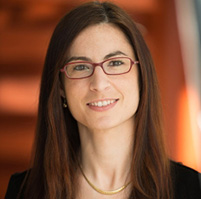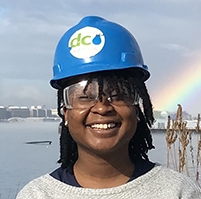WiE celebrates the female faculty who have achieved so much in their careers and in their work at GW. In this series titled "Conversations with SEAS Faculty," current students are matched up to a female faculty member and conduct a brief interview to explore the focus of their work, their sources of inspiration, and their perspectives on women in academia and research.
Professor Anne-Laure Papa, Biomedical Engineering
General Research: Cancer research – developing diagnostic and therapeutic tools based on an integration of cellular components and nanotechnology, for cancer and thrombosis. The Papa lab focuses on the metastatic dissemination – cancer cells that escape from primary tumor into the bloodstream and find a new location to disseminate. Her research develops tools to intercept such cancer cells when they are susceptible in the blood stream, as well as tools to detect circulating tumor cells. The lab also focuses on understanding the effect of nanoparticles and nanomedicines on platelet function and blood proteins.
Q. Please share how you came to join the faculty at SEAS.
A. I joined SEAS following a postdoctoral training at the Wyss Institute for Biologically Inspired Engineering at Harvard. I was excited about the multiple opportunities for collaborations across schools and with the George Washington Medical Faculty Associates.
Q. How did you get into research?
A. I was inspired by some of my professors. They successfully instilled their passion for research, and I am now trying to share some exciting research topics while teaching – even beyond my comfort zone - so that students get exposed to as many fascinating and intriguing questions as possible. I am hoping that some of them would get involved in these important challenges for society.
Q. Who are your role models? Why?
A. I have found a lot of people inspiring at many levels. However, if I would cite only one person I would cite my Mom, who thrived by adapting to a new culture, creating jobs and mentoring other women despite having no formal education. She is an inspiration for me every day.
Q. How much do you feel that gender plays a role in your career advancement?
A. While I personally have not faced significant impediments in my career advancement, women are still underrepresented in STEM research, particularly at the faculty level. While progress is being made, we still have much to achieve for equity and diversity.
Q. What is your parting advice for students and other faculty?
A. My advice for students is to explore the possibilities – via travels, internships, and networking to discover different fields and get a better sense of where they could contribute and align their passions best. Persistence is key (while modulating a few parameters along the way!).
Q. What is the “cool” thing about your research?
A. Our research has the potential to contribute to healthcare. We focus our work on translational cancer research and it would be gratifying to bring technology from the lab to the clinic.
Q. What is your favorite GWU activity?
A. My favorite GWU activity is the joy of exchanging ideas and working with students in the classroom or lab.
Q. What is your favorite thing about DC?
A. I love the National Gallery of Art (particularly marble sculptures in the east sculpture hall) and the beautiful cherry blossoms!



